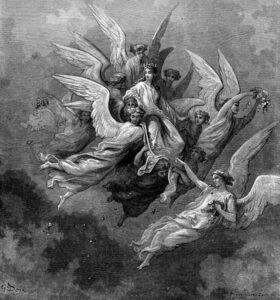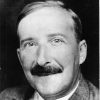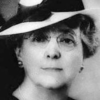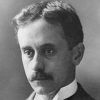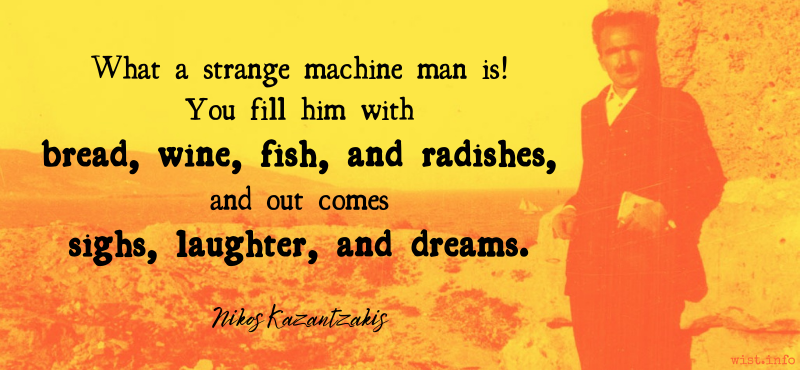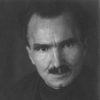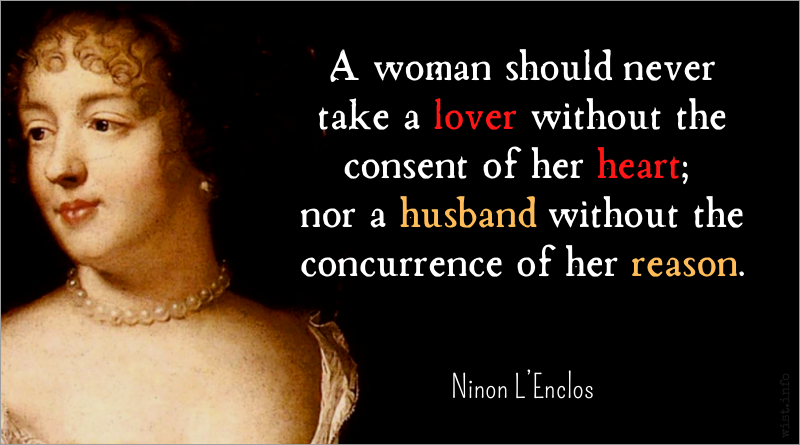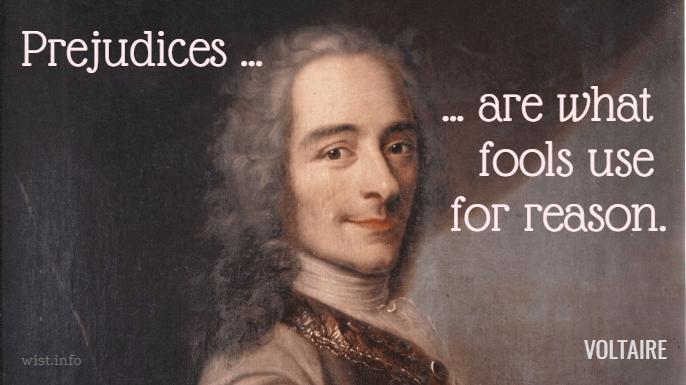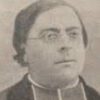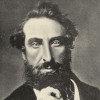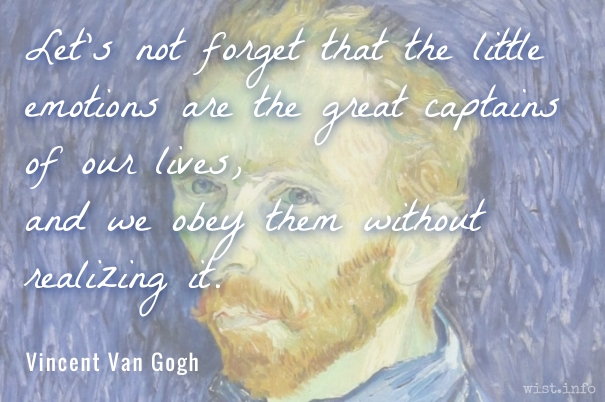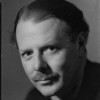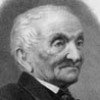We are afraid of having and showing a small mind, and we are not afraid of having and showing a small heart.
Joseph Joubert (1754-1824) French moralist, philosopher, essayist, poet
Pensées [Thoughts], 1805 entry [tr. Auster (1983)]
(Source)
I could not find an analog in other translations of the Pensées.
Quotations about:
emotion
Note not all quotations have been tagged, so Search may find additional quotes on this topic.
Not one drop of blood
is left inside my veins that does not throb:
I recognize signs of the ancient flame.[Men che dramma
di sangue m’è rimaso, che non tremi;
conosco i segni de l’antica fiamma.]Dante Alighieri (1265-1321) Italian poet
The Divine Comedy [Divina Commedia], Book 2 “Purgatorio,” Canto 30, l. 46ff (3.46-68) (1314) [tr. Musa (1981)]
(Source)
Dante, on seeing his long-lost love, Beatrice, repeating to Virgil the lines he had given Dido (Aeneid, 4.23) about how she felt the stirring of long-dead passion upon seeing Aeneas: "Agnosco veteris vestigia flammae" ("I know the traces of the ancient flame" [tr. Kline (2002)]).
(Source (Italian)). Alternate translations:
There is no dram of blood,
That doth not quiver in me. The old flame
Throws out clear tokens of reviving fire.
[tr. Cary (1814)]
There is not one drop
Of blood within me trembling but became:
I know the tokens of the ancient fame.
[tr. Bannerman (1850)]
Not a drachm
Of blood remains in me, that does not tremble;
I know the traces of the ancient flame.
[tr. Longfellow (1867)]
Less than a dram of blood remains to me which trembles not; I recognise the signs of the ancient flame.
[tr. Butler (1885)]
Rests within my frame
No dram of blood that does not tremble now;
I know the symptoms of the olden flame.
[tr. Minchin (1885)]
Less than a drachm of blood remains in me that doth not tremble; I recognize the signals of the ancient flame.
[tr. Norton (1892)]
Less than a drachm of blood
is left in me that trembleth not; I recognise
the tokens of the ancient flame.
[tr. Okey (1901)]
Not a drop of blood is left in me that does not tremble; I know the marks of the ancient flame.
[tr. Sinclair (1939)]
Scarce one drop remains
Of blood in me that trembles not: by this
I recognize the old flame within my veins.
[tr. Binyon (1943)]
There is scarce a dram
That does not hammer and throb in all my blood;
I know the embers of the ancient flame.
[tr. Sayers (1955)]
There is not within me
one drop of blood unstirred. I recognize
the tokens of the ancient flame.
[tr. Ciardi (1961)]
Less than a drop of blood
Is left in me, that is not trembling:
I know the signs of the ancient flame.
[tr. Sisson (1981)]
I am left with less
than one drop of blood that does not tremble:
I recognize the signs of the old flame.
[tr. Mandelbaum (1982)]
There is a barely a drop of blood in me that does not tremble: I know the tokens of the ancient flame.
[tr. Kline (2002)]
Less than a dram of blood is left me that is not trembling: I recognize the signs of the ancient flame!
[tr. Durling (2003)]
There is not one gram
of blood in me that does not tremble now.
I recognize the signs of ancient flame.
[tr. Kirkpatrick (2007)]
Not a single drop of blood
remains in me that does not tremble --
I know the signs of the ancient flame.[tr. Hollander/Hollander (2007)]
There isn't a single drop of whatever blood
Still flows in my veins that isn't shaking from fear:
I recognize the signs of that ancient fire.
[tr. Raffel (2010)]
Only if a child feels right can he think right.
Haim Ginott (1922-1973) Israeli-American school teacher, child psychologist, psychotherapist [b. Haim Ginzburg]
Teacher and Child, ch. 4 “Congruent Communication” (1972)
(Source)
It is the head that governs men. A kind heart is of no use in a chess game.
[On gouverne les hommes avec la tête. On ne joue pas aux échecs avec un bon cœur.]
Nicolas Chamfort (1741-1794) French writer, epigrammist (b. Nicolas-Sébastien Roch)
Products of Perfected Civilization [Produits de la Civilisation Perfectionée], Part 1 “Maxims and Thoughts [Maximes et Pensées],” ch. 8, ¶ 522 (1795) [tr. Merwin (1969)]
(Source)
(Source (French)). Alternate translations:
People are governed with the head; kindness of heart is little use in chess.
[tr. Mathers (1926)]
Men are governed using the head. A kind heart is useless in a chess game.
[tr. Dusinberre (1992)]
A person governs men with his head. One does not play chess with goodness of heart.
[tr. Siniscalchi (1994), ¶ 521]
But the power
of a man’s will is often powerless:
laughter and tears follow so close upon
the passions that provoke them that the more
sincere the man, the less they obey his will.
[Ma non può tutto la virtù che vuole;
ché riso e pianto son tanto seguaci
a la passion di che ciascun si spicca,
che men seguon voler ne’ più veraci.]Dante Alighieri (1265-1321) Italian poet
The Divine Comedy [Divina Commedia], Book 2 “Purgatorio,” Canto 21, l. 105ff (21.105-108) (1314) [tr. Musa (1981)]
(Source)
(Source (Italian)). Alternate translations:
As each alternate Passion leaves a trace
On the still-varying muscles of the face,
Fictitious oft; but, by the candid mind,
Conceal'd with pain, the dawn of dubious joy
My features wore.
[tr. Boyd (1802), st. 20]
But the power which wills,
Bears not supreme control: laughter and tears
Follow so closely on the passion prompts them,
They wait not for the motions of the will
In natures most sincere.
[tr. Cary (1814)]
But will is not with power entire endued.
Laughter and tears pursue so much the trace
The passion dictates that imprints them there,
Nor follow will in natures most sincere.
[tr. Bannerman (1850)]
But yet the power that wills cannot do all things;
For tears and laughter are such pursuivants
Unto the passion from which each springs forth,
In the most truthful least the will they follow.
[tr. Longfellow (1867)]
But virtue cannot all it would; for laughter and tears follow so much the passion from which each springs, that they least obey will in the most truthful men.
[tr. Butler (1885)]
But all it wishes, will cannot forbear:
For smiles and tears to diverse passion wed,
Upon that passion follow so instinct.
In open natures, will is quite outsped.
[tr. Minchin (1885)]
But the power that wills cannot do everything; for smiles and tears are such followers on the emotion from which each springs, that in the most truthful they least follow the will.
[tr. Norton (1892)]
But the virtue which wills is not all powerful;
for laughter and tears follow so closely the passion from which each springs, that they least obey the will in the most truthful.
[tr. Okey (1901)]
But the power to will cannot do all, for laughter and tears are so close followers on the passions from which they spring that they least follow the will in the most truthful.
[tr. Sinclair (1939)]
But all is not done by the will's decree;
For on the passion wherefrom each is bred
Laughter and tears follow so close that least
In the most truthful is the will obeyed.
[tr. Binyon (1943)]
But will with us is not made one with power;
Tears, laughter, tread so hard upon the heel
Of their evoking passions, that in those
Who're most sincere they least obey the will.
[tr. Sayers (1955)]
But man's will
is not supreme in every circumstance:
for tears and laughter come so close behind
the passions they arise from, that they least
obey the will of the most honest mind.
[tr. Ciardi (1961)]
But the power that wills cannot do everything; for smiles and tears are such close followers on the emotion from which each springs, that in the most truthful they least follow the will.
[tr. Singleton (1973)]
But virtue cannot do everything that it will;
For laughter and tears follow so closely on
The passions from which they respectively proceed,
That they follow the will least in the most truthful.
[tr. Sisson (1981)]
And yet the power of the will cannot do all,
for tears and smiles are both so faithful to
the feelings that have prompted them that true
feeling escapes the will that would subdue.
[tr. Mandelbaum (1982)]
But the power of the will cannot do everything,
for laughter and weeping follow so closely on the passion from which each springs that they follow the will least in those who are most truthful.
[tr. Durling (2003)]
But the virtue that wills is not all-powerful, since laughter and tears follow the passion, from which they spring, so closely, that, in the most truthful, they obey the will least.
[tr. Kline (2002)]
But will power can't do everything it wills.
For tears and laughter follow on so close
to those emotions from which each act springs
that these least follow will in those most true.
[tr. Kirkpatrick (2007)]
But the power that wills cannot do all it wills,
for laughter and tears so closely follow feelings
from which they spring, they least can be controlled
in those who are most truthful.
[tr. Hollander/Hollander (2007)]
But will alone won't stop a human being,
Since laughter and tears are deeply interwoven,
Following hard on emotions which spring them forth,
And when they're truthful have little to do with the will.
[tr. Raffel (2010)]
Sticks and stones may break my bones, but words will always hurt me. Bones mend and become actually stronger in the very place they were broken and where they have knitted up; mental wounds can grind and ooze for decades and be re-opened by the quietest whisper.
Stephen Fry (b. 1957) British actor, writer, comedian
Moab Is My Washpot, “Joining In,” ch. 4 (1997)
(Source)
All passions exaggerate; it is only because they exaggerate that they are passions.
[Toutes les passions sont exagératrices, et elles ne sont des passions que parce qu’elles exagèrent.]
Nicolas Chamfort (1741-1794) French writer, epigrammist (b. Nicolas-Sébastien Roch)
Products of Perfected Civilization [Produits de la Civilisation Perfectionée], Part 1 “Maxims and Thoughts [Maximes et Pensées],” ch. 1, ¶ 72 (1795) [tr. Mathers (1926)]
(Source)
(Source (French)). Alternate translations:
All passions are exaggerated, otherwise they would not be passions.
[tr. Hutchinson (1902)]
All of the passions lead to exaggeration. That is why they are passions.
[tr. Merwin (1969)]
All passions involve excess, in fact that's what makes them passions.
[tr. Parmée (2003), ¶59]
All passions exaggerate, and they are only passions because they exaggerate.
[tr. Sinicalchi]
I’ve always felt sorry for people afraid of feeling, of sentimentality, of emotion, who conceal what they feel and are unable to weep with their whole heart. Because those who do not know how to weep with their whole heart don’t know how to laugh either.
Golda Meir (1898-1978) Russian-American-Israeli politician, teacher; Prime Minister of Israel (1969-1974)
Interview by Oriana Fallaci, Ms. (1973-04)
(Source)
The Ms. article is a portion of an interview held in Jerusalem in November 1972. Answering to the charge that she is hard and inflexible, countering that she is very sensitive and feeling in most matters.
The full interview was reprinted in Fallaci, Interview with History, ch. 4 "Golda Meir" (1974) [tr. Shepley (1976)], but slightly rephrased:
I’ve always felt sorry for people who are afraid of their feelings, of their emotions, and who hide what they feel and can’t cry wholeheartedly. Because anyone who can’t cry wholeheartedly can’t laugh wholeheartedly either.
Was this re-edited (and in which instance?), or is it a matter of different translation? It's unclear in what language the interview was conducted, but the original edition of the book (Intervista con la Storia) was in Italian, Fallaci's native language, which gave the passage as follow:
A me ha sempre fatto pena la gente che ha paura dei sentimenti, delle emozioni, e nasconde quello che prova e non sa piangere con tutto il cuore. Perché chi non sa piangere con tutto il cuore non sa nemmeno ridere a gola spiegata.
I’m struck by how laughter connects you with people. It’s almost impossible to maintain any kind of distance or any sense of social hierarchy when you’re just howling with laughter. Laughter is a force for democracy.
Although reason were intended by Providence to govern our passions; yet it seems that in two points of the greatest moment to the being and continuance of the world, God has intended our passions to prevail over reason. The first is, the propagation of our species; since no wise man ever married from the dictates of reason. The other is, the love of life; which, from the dictates of reason, every man would despise, and wish it at an end, or that it never had a beginning.
Determination in a single instance is an expression of courage; if it becomes characteristic, a mental habit. But here we are referring not to physical courage but to courage to accept responsibility, courage in the face of a moral danger. This has often been called courage d’esprit, because it is created by the intellect. That, however, does not make it an act of the intellect: it is an act of temperament. Intelligence alone is not courage; we often see that the most intelligent people are irresolute. Since in the rush of events a man is governed by feelings rather than by thought, the intellect needs to arouse the quality of courage, which then supports and sustains it in action.
Looked at in this way, the role of determination is to limit the agonies of doubt and the perils of hesitation when the motives for action are inadequate.
[Die Entschlossenheit ist ein Akt des Muthes in dem einzelnen Fall, und wenn sie zum Charakterzug wird, eine Gewohnheit der Seele. Aber hier ist nicht der Muth gegen körperliche Gefahr, sondern der gegen die Verantwortung, also gewissermassen gegen Seelengefahr gemeint. Man hat diesen oft courage d’esprit genannt, weil er aus dem Verstande entspringt, aber er ist darum kein Akt des Verstandes, sondern des Gemüths. Blosser Verstand ist noch kein Muth, denn wir sehen oft die gescheitesten Leute ohne Entschluss. Der Verstand muss also erst das Gefühl des Muthes erwecken, um von ihm gehalten und getragen zu werden, weil im Drange des Augenblicks Gefühle den Menschen stärker beherrschen als Gedanken.
Wir haben Uer der Entschlossenheit diejenige Stelle angewiesen, wo sie bei nicht hinrechenden Motiven die Qualen der Zweifel, die Gefahren des Zauderns heben soll.]
Karl von Clausewitz (1780-1831) Prussian soldier, historian, military theorist
On War [Vom Kriege], Book 1, ch. 3 “On Military Genius [Der Kriegerische Genius],” (1.3) (1832) [tr. Howard & Paret (1976)]
(Source)
(Source (German)). Alternate translations:
Resolution is an act of courage in single instances, and if it becomes a characteristic trait, it is a habit of the mind. But here we do not mean courage in face of bodily danger, but in face of responsibility, therefore to a certain extent against moral danger. This has been often called courage d'esprit, on the ground that it springs from the understanding; nevertheless, it is no act of the understanding on that account it is an act of feeling. Mere intelligence is still not courage, for we often see the cleverest people devoid of resolution. The mind must, therefore, first awaken the feeling of courage, and then be guided and supported by it, because in momentary emergencies the man is swayed more by his feelings than his thoughts.
We have assigned to resolution the office of removing the torments of doubt, and the dangers of delay, when there are no sufficient motives for guidance
[tr. Graham (1873)]
Resolution is an act of courage in a single instance, and, if it becomes a characteristic trait, a habit of the mind. But here we do not mean courage in facing physical danger, butr courage in facing responsiblity, therefore to a certain extent in facing moral danger. This has often been called courage d'esprit, on the ground that it springs from the intellect, but it is not on that account for an act of the intellect but one of feeling. Mere intellect is not quite courage, for we often see the cleverest people devoid of resolution. The intellect must first, therefore, awaken the feeling of courage to be maintained and supported by it, because in emergencies of the moment man is governed more by his feelings than by his thoughts.
We have assigned to resolution the office of removing the torments of doubt and the dangers of hesitation when there are no sufficient motives for guidance.
[tr. Jolles (1943)]
ENOBARBUS: When valor preys on reason,
It eats the sword it fights with.William Shakespeare (1564-1616) English dramatist and poet
Antony and Cleopatra, Act 3, sc. 13, ll. 240ff (3.13.240-241) (1607)
(Source)
And the host laughed and wept, and in the midst of their merriment and tears the clear voice of the minstrel rose like silver and gold, and all men were hushed. And he sang to them, now in the Elven-tongue, now in the speech of the West, until their hearts, wounded with sweet words, overflowed, and their joy was like swords, and they passed in thought out to regions where pain and delight flow together and tears are the very wine of blessedness.
J.R.R. Tolkien (1892-1973) English writer, fabulist, philologist, academic [John Ronald Reuel Tolkien]
The Lord of the Rings, Vol. 3: The Return of the King, Book 6, ch. 4 “The Field of Cormallen” (1955)
(Source)
It is compassion rather than the principle of justice which can guard us against being unjust to our fellow men.
Eric Hoffer (1902-1983) American writer, philosopher, longshoreman
The Passionate State of Mind, Aphorism 140 (1955)
(Source)
Try to remember this: what you project
Is what you will perceive; what you perceive
With any passion, be it love or terror,
May take on whims and powers of its own.
There is a road from the eye to the heart that does not go through the intellect. Men do not quarrel about the meaning of sunsets; they never dispute that the hawthorn says the best and wittiest thing about the spring.
Gilbert Keith Chesterton (1874-1936) English journalist and writer
“A Defence of Heraldry,” The Defendant (1901)
(Source)
The Intellect engages us in the pursuit of Truth. The Passions impel us to Action.
[Cogitatio in vero exquirendo maxime versatur, appetitus impellit ad agendum.]
Marcus Tullius Cicero (106-43 BC) Roman orator, statesman, philosopher
De Officiis [On Duties; On Moral Duty; The Offices], Book 1, ch. 35 (1.35) / sec. 132 (44 BC) [Barnes (1814)]
(Source (Latin)). Alternate translation:
Reflection is chiefly employed in the investigation of truth, appetite impels to action.
[tr. McCartney (1798)]
Reflection chiefly applies itself in the search of truth. Appetite prompts us to action.
[tr. Edmonds (1865)]
Thought is occupied chiefly in seeking the truth; impulse urges to action.
[tr. Peabody (1883)]
Thought is employed in the discovery of truth, appetite impels to action.
[tr. Gardiner (1899)]
Thought is occupied chiefly with the discovery of truth; impulse prompts to action.
[tr. Miller (1913)]
Thought is mostly expended in seeking out the truth, passion urges men to action.
[tr. Edinger (1974)]
The head never rules the heart, but just becomes its partner in crime.
Mignon McLaughlin (1913-1983) American journalist and author
The Second Neurotic’s Notebook, ch. 5 (1966)
(Source)
The truth is sometimes seen, but rarely heard: on the fewest of occasions does it arrive in its elemental purity, especially if it has travelled far, for then it is always soiled by what has happened on the road: for feeling tinges with her colors all that she touches, sometimes happily, sometimes unhappily: she always leaves some kind of mark.
[La verdad ordinariamente se ve, extravagantemente se oye; raras veces llega en su elemento puro, y menos cuando viene de lejos; siempre trae algo de mixta, de los afectos por donde pasa; tiñe de sus colores la pasión cuanto toca, ya odiosa, ya favorable. Tira siempre a impresionar.]
Baltasar Gracián y Morales (1601-1658) Spanish Jesuit priest, writer, philosopher
The Art of Worldly Wisdom [Oráculo Manual y Arte de Prudencia], § 80 (1647) [tr. Fischer (1937)]
(Source)
(Source (Spanish)). Alternate translation:
Commonly truth is seen, but it is extraordinary to hear it. It seldom comes pure to our ears, especially when it come from a far. For then it takes some tincture of the passions that it meets by the way. It pleases or displeases, according to the colours that passion or interest give it, which aim always at prepossessing.
[Flesher ed. (1685)]
The truth is generally seen, rarely heard; seldom she comes in elemental purity, especially from afar; there is always some admixture of the moods of those through whom she has passed. The passions tinge her with their colors wherever they touch her, sometimes favorably, sometimes the reverse.
[tr. Jacobs (1892)]
Truth is more often seen than heard. Seldom does it reach us unalloyed, even less so when it comes from afar. It is always blended with the emotions it has passed through. Emotion taints everything it touches, making it odious or favorable. It tries always to impress us one way or another.
[tr. Maurer (1992)]
Wretchedness is caused by emotional disturbances, and the happy life by calmness, and disturbance takes two forms — anxiety and fear in expecting evils, ecstatic joy and lustful thoughts in misunderstanding good things, all of which are at variance with with wisdom and reason. Accordingly, if a man possesses self-control and consistency, and is without fear, distress, excitability, or lust, is he not happy? But this is the nature of the wise man always, so he is happy always.
[Atque cum perturbationes animi miseriam, sedationes autem vitam efficiant beatam, duplexque ratio perturbationis sit, quod aegritudo et metus in malis opinatis, in bonorum autem errore laetitia gestiens libidoque versetur, quae omnia cum consilio et ratione pugnent, his tu tam gravibus concitationibus tamque ipsis inter se dissentientibus atque distractis quem vacuum solutum liberum videris, hunc dubitabis beatum dicere? atqui sapiens semper ita adfectus est; semper igitur sapiens beatus est.]
Marcus Tullius Cicero (106-43 BC) Roman orator, statesman, philosopher
Tusculan Disputations [Tusculanae Disputationes], Book 5, ch. 15 (5.15) / sec. 43 (45 BC) [tr. Davie (2017)]
(Source)
(Source (Latin)). Alternate translations:
Now since the Disturbances of the Soul render the Life miserable, but the composure of them happy; and there is a double rank of Passions; in that, Discontent and Fear are terminated on Evils conceiv'd; but excessive Mirth and Lust arise from the misapprehension of good things, since all are inconsistent with Advice and Reason, if you shall see any one clear, emancipated, free from these emotions so vehement, so discordant one with the other, and so distracting, can you make any question of calling him Happy? But the Wise man is always so dispos'd, therefore the Wise man is always Happy.
[tr. Wase (1643)]
But as the perturbations of the mind make life miserable, and tranquility renders it happy: and as these perturbations are of two sorts; grief and fear, proceeding from imagined evils, immoderate joy and lust, from the mistake of what is good; and all these are in opposition to reason and counsel; when you see a man at ease, quite free and disengaged from such troublesome commotions, which are so much at variance with one another, can you hesitate to pronounce such a one a happy man? Now the wise man is always in such a disposition: therefore the wise man is always happy.
[tr. Main (1824)]
But when the perturbations render life unhappy, while their repose makes it happy -- and since the mode of perturbation is twofold -- sorrow and fear having birth from reputed evils -- the delirium of joy and desire, from the delusion of good, -- when all these are repugnant to counsel and reason, and you see a man void, exempt, free from these excitements, so vehement, so discordant, so distracted by mutual conflicts, -- will you hesitate to pronounce him happy? But the wise man is always thus, and therefore always happy.
[tr. Otis (1839)]
But as the perturbations of the mind make life miserable, and tranquillity renders it happy; and as these perturbations are of two sorts, grief and fear, proceeding from imagined evils, and as immoderate joy and lust arise from a mistake about what is good, and as all these feelings are in opposition to reason and counsel; when you see a man at ease, quite free and disengaged from such troublesome commotions, which are so much at variance with one another can you hesitate to pronounce such an one a happy man? Now the wise man is always in such a disposition, therefore the wise man is always happy.
[tr. Yonge (1853)]
Now since perturbations of mind create misery, while quietness of mind makes life happy, and since there are two kinds of perturbations, grief and fear having their scope in imagined evils, inordinate joy and desire in mistaken notions of the good, all being repugnant to wise counsel and reason, will you hesitate to call him happy whom you see relieved, released, free from these excitements so oppressive, and so at variance and divided among themselves? Indeed one thus disposed is always happy. Therefore the wise man is always happy.
[tr. Peabody (1886)]
Emotion doesn’t travel in a straight line. Like water, our feelings trickle down through cracks and crevices, seeking out the little pockets of neediness and neglect, the hairline fractures in our character usually hidden from public view.
For one’s emotional state is always determined by the oddest and most accidental things, and it is precisely the most superficial factors that often fortify or diminish our courage.
Stefan Zweig (1881-1942) Austrian novelist, playwright, journalist, biographer
Beware of Pity (1939)
(Source)
A cloudy day, or a little sunshine, have as great an influence on the constitutions as the most real blessings or misfortunes.
Joseph Addison (1672-1719) English essayist, poet, statesman
The Spectator #162 (5 Sep 1711)
(Source)
But feeling is so different from knowing. My common sense tells me all you can say, but there are times when common sense has no power over me. Common nonsense takes possession of my soul.
I must learn to love the fool in me, the one who feels too much, talks too much, takes too many chances, wins sometimes and loses often, lacks self-control, loves and hates, hurts and gets hurt, promises and breaks promises, laughs and cries. It alone protects me against that utterly self-controlled, masterful tyrant whom I also harbor and who would rob me of human aliveness, humility, and dignity, but for my fool.
Laugh if you will,
My queen, but let me be a woman still.
You fairies love where love is wise and just;
We mortal women love because we must.Charlton Miner Lewis (1866-1923) American scholar of English literature, author
Gawayne and the Green Knight, Canto 2 “Elfinhart” (1903)
(Source)
The emotions I feel are no more meant to be shown in their unadulterated state than the inner organs by which we live.
Hannah Arendt (1906-1975) German-American philosopher, political theorist
The Life of the Mind (1978)
(Source)
Newton and Descartes started to try and prove that God existed in the same way as they would try and prove something in the laboratory or with their mathematics … And when you try and mix science and religion you get bad science and bad religion. The two are doing two different things. … Science can give you a diagnosis of cancer. It can even cure your disease, but it cannot touch your grief and disappointment, nor can it help you to die well.
Karen Armstrong (b. 1944) British author, comparative religion scholar
“The Reason of Faith,” Interview with Michael Brunton, Ode (Sep-Oct 2009)
(Source)
A woman should never take a lover without the consent of her heart; nor a husband without the concurrence of her reason.
Anne "Ninon" de l'Enclos (1620-1705) French author, courtesan, patron of the arts [Ninon de Lenclos, Ninon de Lanclos]
The Memoirs of Ninon de L’Enclos, Vol. 1, “Life and Character” (1761)
(Source)
NEMO: What you fail to understand is the power of hate. It can fill the heart as surely as love can.
Earl Felton (1909-1972) American screenwriter
20,000 Leagues Under the Sea, screenplay (1954) [with Richard Fleischer]
(Source)
Explaining his campaign on wagers of war. Based on the novel by Jules Verne (1870). The words are not in the novel.
Political campaigns tend to be exercises in progressive degeneration. The steady increase, week after week, in excitement and strain and weariness produces an oversimplification of issues, an over dramatization of alternatives, a growing susceptibility to extreme and catastrophic statements. Candidates find themselves shouting things in the fall that they would never dream of whispering in the summer.
Arthur M. Schlesinger, Jr. (1917-2007) American historian, author, social critic
The Age of Roosevelt, ch. 33, sec. 8 (1960)
(Source)
One must not always think that feeling is everything. Art is nothing without form.
Never apologize for showing feeling, my friend. Remember that when you do so, you apologize for truth.
Benjamin Disraeli (1804-1881) English politician and author
Contarini Fleming, ch. 13 (1832)
(Source)
We have all heard enough to fill a book about Dr. Johnson’s incivilities. I wish they would compile another book consisting of Dr. Johnson’s apologies. There is no better test of a man’s ultimate chivalry and integrity than how he behaves when he is wrong; and Johnson behaved very well. He understood (what so many faultlessly polite people do not understand) that a stiff apology is a second insult. He understood that the injured party does not want to be compensated because he has been wronged; he wants to be healed because he has been hurt.
If the old fairy-tale ending ‘They lived happily ever after’ is taken to mean ‘They felt for the next fifty years exactly as they felt the day before they were married’’, then it says what probably never was nor ever would be true, and would be highly undesirable if it were. Who could bear to live in that excitement for even five years? What would become of your work, your appetite, your sleep, your friendships?
C. S. Lewis (1898-1963) English writer, literary scholar, lay theologian [Clive Staples Lewis]
Mere Christianity, “Christian Marriage” (1952)
(Source)
What we call ‘being in love’ is a glorious state, and, in several ways, good for us. It helps to make us generous and courageous, it opens our eyes not only to the beauty of the beloved but to all beauty, and it sub-ordinates (especially at first) our merely animal sexuality; in that sense, love is the great conqueror of lust. No one in his senses would deny that being in love is far better than either common sensuality or cold self-centredness.
But, as I said before, ‘the most dangerous thing you can do is to take any one impulse of our own nature and set it up as the thing you ought to follow at all costs’. Being in love is a good thing, but it is not the best thing. There are many things below it, but there are also things above it. You cannot make it the basis of a whole life. It is a noble feeling, but it is still a feeling. Now no feeling can be relied on to last in its full intensity, or even to last at all. Knowledge can last, principles can last, habits can last; but feelings come and go. And in fact, whatever people say, the state called ‘being in love’ usually does not last.
C. S. Lewis (1898-1963) English writer, literary scholar, lay theologian [Clive Staples Lewis]
Mere Christianity, Book 3, ch. 6 “Christian Marriage” (1952)
(Source)
Our Passions, Ambition, Avarice, Love, Resentment &c possess so much metaphysical Subtilty and so much overpowering Eloquence, that they insinuate themselves into the Understanding and the Conscience and convert both to their Party. And I may be deceived as much as any of them, when I Say, that Power must never be trusted without a Check.
John Adams (1735-1826) American lawyer, Founding Father, statesman, US President (1797-1801)
Letter to Thomas Jefferson (2 Feb 1816)
(Source)
Reason! reason! … As much as you like; but beware of thinking that it answers to everything, suffices for everything, satisfies everything. This mother loses her child: will reason comfort her? Does cool reason counsel the inspired poet, the heroic warrior, the lover? Reason guides but a small part of man, and that the least interesting. The rest obeys feeling, true or false, and passion, good or bad.
Joseph Roux (1834-1886) French Catholic priest
Meditations of a Parish Priest: Thoughts, ch. 4, #95 (1886)
(Source)
I am an atheist, out and out. It took me a long time to say it. I’ve been an atheist for years and years, but somehow I felt it was intellectually unrespectable to say one was an atheist, because it assumed knowledge that one didn’t have. Somehow it was better to say one was a humanist or an agnostic. I finally decided that I’m a creature of emotion as well as of reason. Emotionally I am an atheist. I don’t have the evidence to prove that God doesn’t exist, but I so strongly suspect he doesn’t that I don’t want to waste my time.
Emotion, whether of ridicule, anger, or sorrow, — whether raised at a puppet show, a funeral, or a battle, — is your grandest of levelers. The man who would be always superior should be always apathetic.
Let’s not forget that the little emotions are the great captains of our lives, and we obey them without realizing it.
The voice of passion is better than the voice of reason.
The passionless cannot change history.Czesław Miłosz (1911-2004) Polish-Lithuanian poet, essayist, diplomat
“The Child of Europe” (1946)
(Source)
Reasoning will never make a Man correct an ill Opinion, which by Reasoning he never acquired.
Jonathan Swift (1667-1745) English writer and churchman
“Letter to a Young Clergyman” (9 Jan 1720)
(Source)
Earliest version of this general sentiment, which has been attributed to (or at times borrowed by) figures such as Sydney Smith, Fisher Ames, and Lyman Beecher.
For more information about this quotation: You Cannot Reason People Out of Something They Were Not Reasoned Into – Quote Investigator.
In short, we can judge by nothing but Appearances, and they are very apt to deceive us. Some put on a gay chearful Outside, and appear to the World perfectly at Ease, tho’ even then, some inward Sting, some secret Pain imbitters all their Joys, and makes the Balance even: Others appear continually dejected and full of Sorrow; but even Grief itself is sometimes pleasant, and Tears are not always without their Sweetness: Besides, Some take a Satisfaction in being thought unhappy, (as others take a Pride in being thought humble,) these will paint their Misfortunes to others in the strongest Colours, and leave no Means unus’d to make you think them thoroughly miserable; so great a Pleasure it is to them to be pitied; Others retain the Form and outside Shew of Sorrow, long after the Thing itself, with its Cause, is remov’d from the Mind; it is a Habit they have acquir’d and cannot leave.
Benjamin Franklin (1706-1790) American statesman, scientist, philosopher, aphorist
“A Dissertation on Liberty and Necessity” (1725)
(Source)
Nothing for preserving the body like having no heart.
The man who has no tincture of philosophy goes through life imprisoned in the prejudices derived from common sense, from the habitual beliefs of his age or his nation, and from convictions which have grown up in his mind without the co-operation or consent of his deliberate reason.


